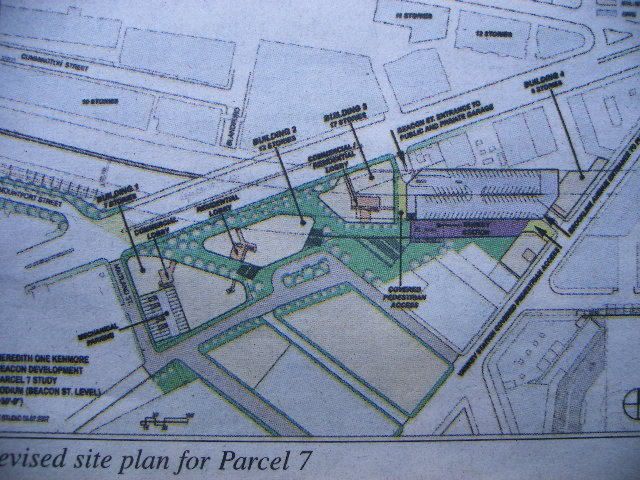Fenway Center Developer Has New Model For ?Building On Air?
By Paul McMorrow
Banker & Tradesman Staff Writer
Yesterday
Developer John Rosenthal said the revenue sharing agreement he and state transportation officials announced Thursday afternoon will become a model for getting air rights developments off architectural boards, and onto the streets.
"This will absolutely be a model," said Rosenthal, the developer behind the proposed $500 million, 1.5 million square foot Fenway Center project. "Other air rights projects will be built based on this."
While predevelopment work on most other Turnpike projects has ground to a halt over the past several months, Rosenthal and state officials have been huddling, working to overcome the kinds of financing and construction hurdles that grounded Columbus Center.
They emerged Thursday with a revenue-sharing agreement that will give Rosenthal breathing room on the front end, and grant the state a windfall of hundreds of millions of dollars on the back end.
Rosenthal's development site straddles Turnpike lanes and parking lots between Beacon Street and Brookline Avenue, in the shadow of Fenway Park. Half is solid ground, and half is air. Rosenthal said he's paying market rates for the site as if it were entirely land. His firm will assume sole responsibility for building the deck above the Turnpike.
Initially, Rosenthal said, lease payments will flow back to his firm to make up for the cost of developing buildings above the roadway.
"They recognize the difficulties of building on air," he said. "We'll treat is as prepaid rent. Once the deck is economically neutral, net payments flow to the state."
Rosenthal estimated that the state would net more than $300 million in revenue over the 99-year lease's lifetime.
"It's incredibly difficult to finance an existing building, never mind new construction over two rail lines and eight lanes of highway," the developer said. The revenue-sharing agreement lets him finance the entire deal as if it were on solid land; financing from MassHousing and the AFL-CIO Housing Investment Trust, and a 20-year lease with Longwood medical-area tenants for the bulk of his parking garage's spots mean the first phase of work will commence in 2011, as soon as his $12 million reconstruction of Yawkey Station is complete.
Outgoing Transportation Secretary James Aloisi said one of his frustrations has been "how difficult it seems for the Turnpike to actually complete successful real estate deals." He added, "This will be a model for how we will leverage our transportation real estate assets."


